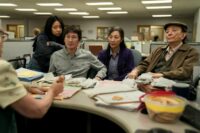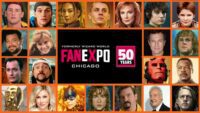By this point most people with any particular interest in seeing Doctor Strange in the Multiverse of Madness have seen it, either in theaters, or at home via VOD or Disney+, where it dropped last week. The initial response to it was decidedly mixed; some loved it, some hated it, some loved certain parts and hated other parts. So with the aversion to spoilers no longer in play, I feel like we’re on the same page to do a deep dive—not just because I’m in the “loved it” camp, but because I feel it has underrated depth in which to make a dive, if you’ll see what I did there.
Of course, the surface level has a lot to enjoy all on its own. My friends can attest that when the title card “Directed by Sam Raimi” popped up at the end, I said out loud, “Yeah, no kidding!” Apart from his experience in the superhero genre, what’s really great is the way he brings a horror movie sensibility to the table here—specifically his brand of horror, which can be Extra to the point of camp while still being genuinely creepy and unnerving. It’s just so much fun. Things like the irreverently gruesome deaths, not gory by horror movie standards, but delightfully out-of-place in a Marvel movie; Wanda appearing at Kamar-Taj in a shroud of storm clouds, her hands glowing like a pair of evil red eyes peering out of the darkness; Christine telling malevolent spirits to “go back to Hell” before blasting them with a mystical flamethrower… Sometimes the simplest pleasures are just the best. Leaning so far into horror tropes also connects interestingly with the themes as presented in the script.
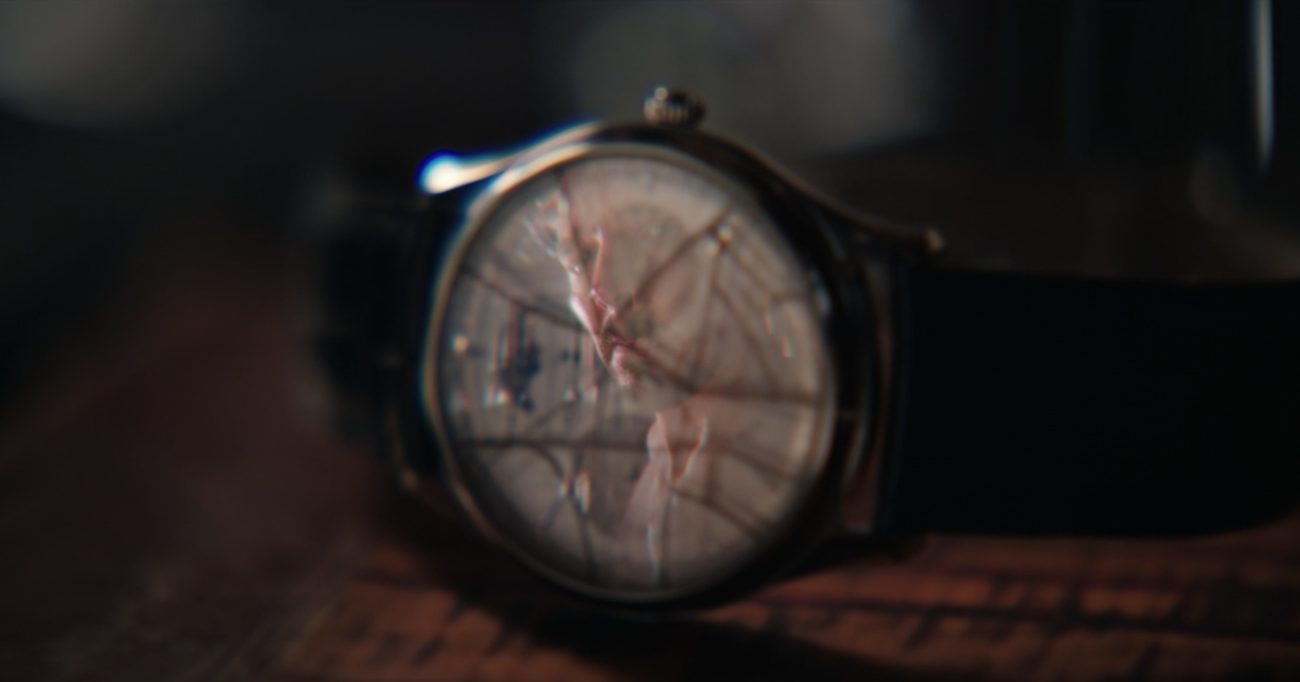
Ah yes, the script. Even most of the people who liked the movie agree that the writing is a mess, but I do not. It’s flawed, certainly, but I think Michael Waldron’s script is actually far more coherent and nuanced than people give it credit for. As with Avengers: Age of Ultron, similarly maligned by many for characterization choices and similarly beloved by me for its intelligence and ambition, (I think Black Panther is the most well-made Marvel movie, but Age of Ultron is my favorite) all of the relevant ideas and pieces of the central themes are present in the film, even if they’re not emphasized or implemented enough. I take issue with the way Multiverse leaves me to do more than my fair share of work to connect those dots, but I see where the dots are.
I certainly respect why other people in the audience might not want to put in the extra work to connect the dots, especially if their primary interest in Marvel movies is the ongoing superhero soap opera: “What happens to our heroes next week?” And let me clarify right now that I say this not to be an elitist snob or because I think my perspective is so much more enlightened than anyone else’s. If anything, I’m probably the foolish one for coming to Marvel movies—largely homogenized money-making machines for the largest entertainment corporation in the world—for things like subtlety and thematic depth. But I also don’t think it’s ever wrong to over-analyze media and find meaning even beyond the authors’ intentions, so long as it’s done in good faith and not in an attempt to tell other people to stop having fun.
Or, I guess, tell people to start having fun against their wishes. Or something. That phrasing got away from me a bit.
So, the biggest single sticking point in the script for people seems to be Wanda’s abrupt transition from where we left her at the end of Wandavision to the full-on scenery-chewing supervillain she is here. I totally understand that, but I’m not too bothered by it myself, possibly for the shallow reason that watching supervillain Wanda is just fun—Elizabeth Olsen excels in yet another new corner of the massive acting range this character has taken her through. I would say that the rough transition doesn’t affect the quality of Multiverse of Madness as a standalone story, and in a way that’s true, but let’s be practical here: this is not really a standalone story. Even by Marvel standards, the plot here is very entrenched in the established continuity thus far.
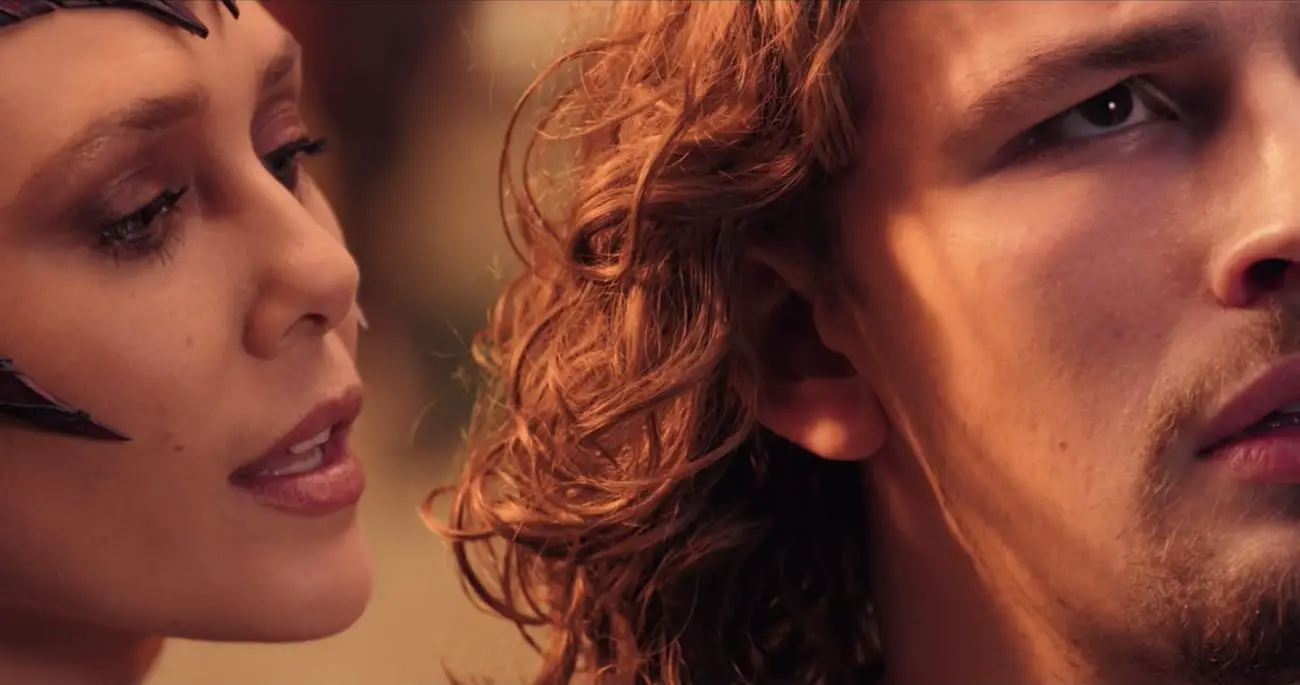
This entrenchment makes some gaps in the shared-universe storytelling problematic, the most glaring of which being the question, “Why isn’t Wanda looking for a world in which her husband Vision is also alive?” Now, I can give you my rationale for that: Wanda knows she can deceive her alternate universe children into believing she’s the mother they already know, but she wouldn’t be able to do that with Vision (or her brother Pietro, who should also be on her wish-list and goes unmentioned), so she decides to prioritize just her children. This would also reinforce her self-deluded narrative that she’s being “reasonable,” because she’s settling for less than she wants. That said, I just made all of that up myself; even though my head-canon fits cleanly into the gaps, the fact that I had to fill the gaps in the first place is a mark against the film.
So yes, I very much agree there’s some clumsiness here. Multiverse simultaneously asks you to be familiar with a bunch of past pieces of the MCU, and also digs a couple of holes in its storytelling that are most obvious to people familiar with those pieces. That’s the double-edged nature of Marvel’s emphasis on shared-universe storytelling, after all.
That said, there are different aspects of continuity that movies can lean on to different effects. For instance, one staple of Marvel’s philosophy towards continuity is fan-service, which all of their properties rely on at least a bit, but some more than others. Avengers: Endgame and Spider-Man: No Way Home both relied primarily on Memberberries and superficial crossover moments as their way into the audience’s hearts—and it worked spectacularly for both films, but I personally was not as enthused. I could rant for pages, for instance, about why the big cheer moment of Cap holding Mjolnir is empty and meaningless, but I know I’m in the minority and I wouldn’t expect any of you to stop having fun with it due to my grouching.
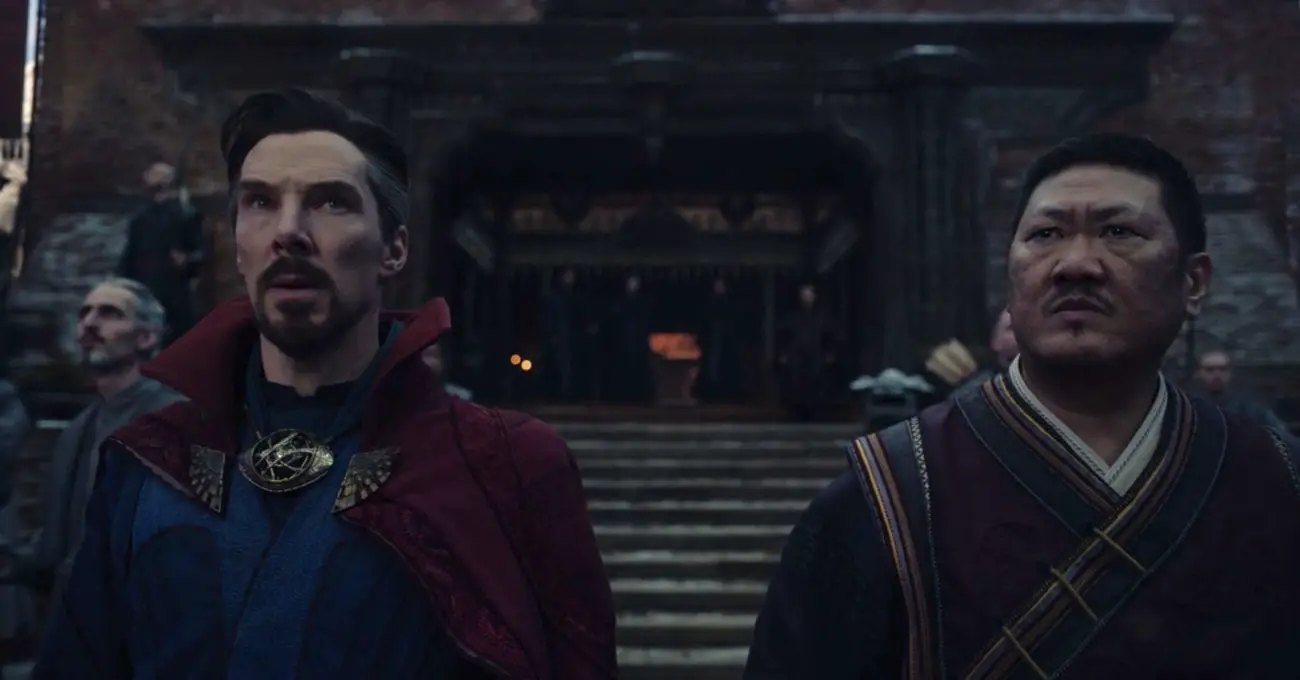
The point I almost wandered away from there is that Multiverse, for all its reliance on established Marvel continuity, does more of the kind of shared-universe storytelling that appeals to me: building on established characters, dynamics, and ideas to tell a cohesive story with a satisfying character arc and a thematic identity of its own.
Before I elaborate on that, I think I should make one more digression to acknowledge the cameo cavalcade that is the Illuminati, because yes, that is high-octane fan-service of the most Marvelous kind. And I won’t pretend I’m so obnoxiously highbrow that I’m immune to that stuff; I absolutely did a little happy wiggly dance in my seat when Patrick Stewart entered to the theme music from the 90s X-Men cartoon. But it also helps that A) the Marvel cameos are all focused in this one plot element, which is less/better than I expected going in from the film’s logline, and B) that their fan-service identities don’t derail the plot. They could have been new, original characters and it wouldn’t change anything because Stephen doesn’t know any of their variants from his universe, except for Mordo.
Mordo as an exception is also noteworthy. His glorified cameo is less than what I had hoped for, since Chiwetel Ejiofor is one of my favorite actors. But really it didn’t need to be anything more than what it was to serve the plot. Stephen is able to use his knowledge of 616-Mordo to get into 838-Mordo’s head, and to goad him into recklessness, securing himself a chance to escape. (And again in the land of simple pleasures: we get to watch Ejiofor wield a sword.)
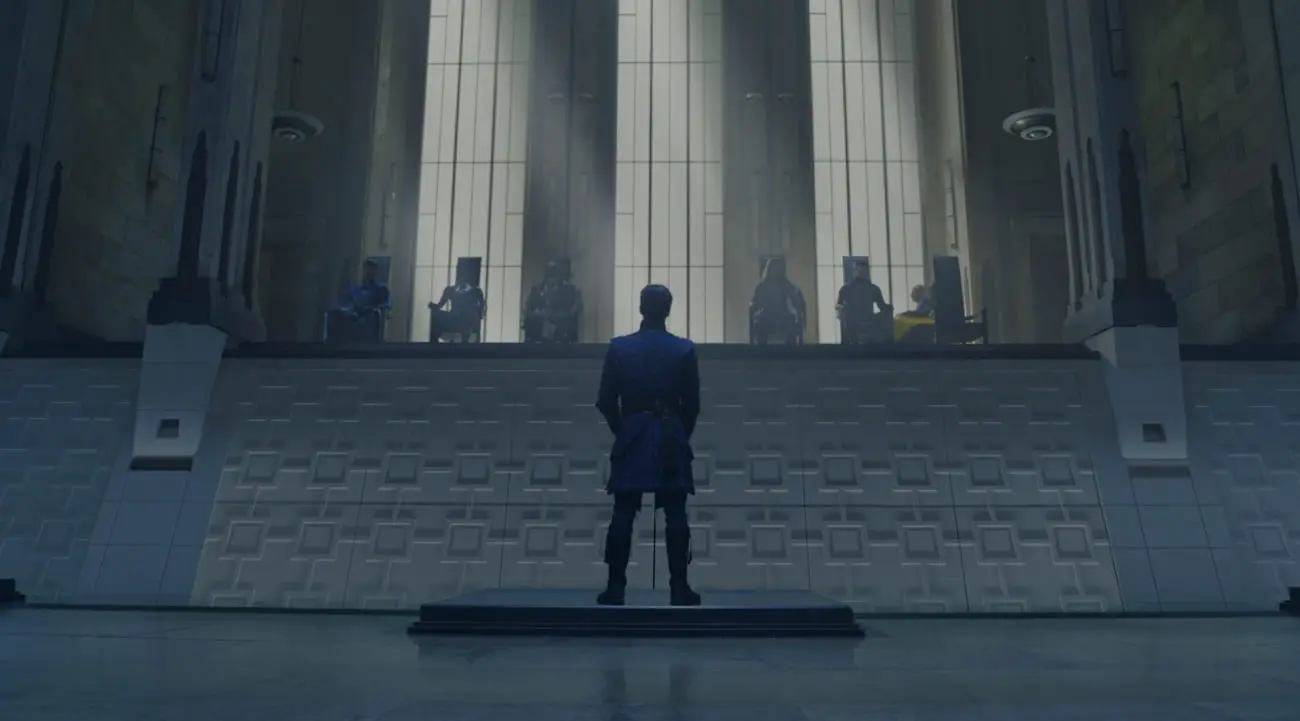
The way that Mordo’s role here builds on Stephen’s relationship with his Mordo in the first Doctor Strange is one of the things I really enjoy, not least of which because I also enjoyed that movie more than most. As far removed as this Scarlet Witch vs. the multiverse plot is from anything that transpired in Stephen’s screen debut, the script is loaded with references to it—the low-key kind that don’t feel like references unless you’ve watched the first film recently or often. For example, in Doctor Strange, Kaecilius calls The Ancient One a hypocrite, because she draws the power to extend her life from the Dark Dimension, whose evil she and her order of sorcerers are avowed to protect this dimension from. In Multiverse, when Stephen uses the forbidden power of the Darkhold to possess his alternate self’s dead body in order stop Wanda, she calls out his hypocrisy as well.
Now of course, little references like that don’t mean much on their own. Why does it matter that Wanda calls Stephen a hypocrite? Why is that more meaningful than any other random reference, and why does it feel like more than a coincidence in the writing? Because Stephen, like the Ancient One, is willing to break the rules to serve the greater good. It’s not always the right choice, but it’s a choice Stephen has to keep making over and over, and each time he does there is always the question of whether this time it’s a mistake.
As the Ancient One tells him in the first film, Stephen is, and always has been, driven by the fear of failure. Stephen says that’s what made him a great doctor, but the Ancient One assures him that it’s the very thing keeping him from greatness. In Multiverse, we get a brief glimpse into a (perhaps the) formative trauma behind this neurosis: the death of his sister when they were children, and Stephen’s inability to save her. This made Stephen into an overachiever, and also into a control freak. As Christine puts it, “(he has) to be the one holding the knife.” When he loses the use of his hands at the start of the first movie, his determination to find a way to fix them at any cost might be admirable, but it’s unhealthy because it is rooted in fear. His hands were the source of his mastery over the world, his point of control, and without full usage of them, he sees himself as all the more vulnerable to loss.
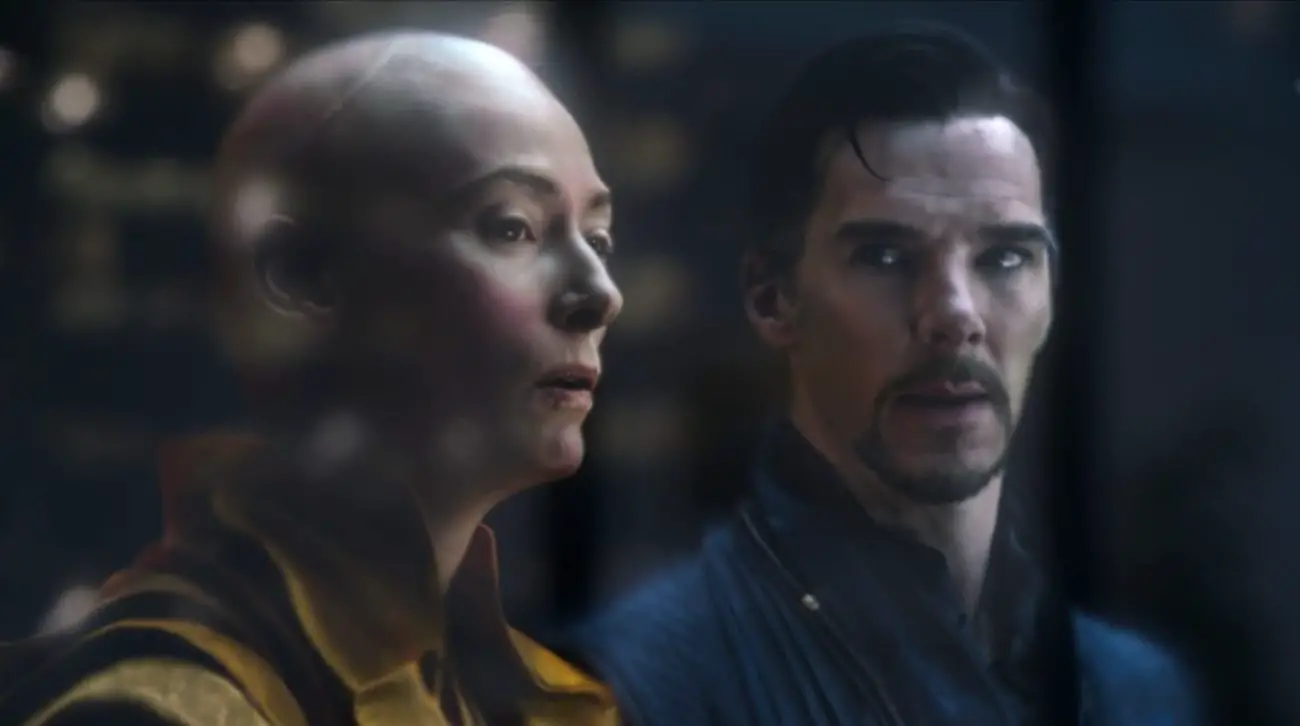
The first Doctor Strange focused on his journey away from arrogance. He learns to accept that there are more important things than his own personal loss. This is symbolized firstly in his refusal to channel magic to fix his hands in exchange for the ability to use it to protect the world; and secondarily in the final confrontation, when he creates a time loop in which he suffers death after agonizing death at Dormammu’s hands in exchange for preventing Dormmamu from entering his dimension. Of course, this doesn’t mean his personality is completely reformed and his mental issues are cured or anything; that’s not how people work. At the very least, he ought to start going to therapy, as should more superheroes, but now I digress. The point is, it’s growth.
His role in Infinity War/Endgame is a secondary one, but it does contain an important piece of characterization that comes up multiple times in Multiverse. He uses magic to look ahead into millions of possible futures, and finds just one in which they defeat Thanos. The exact mechanics of this scene, such as how much of these futures he’s able to see, are not explained. But when Stephen gives Thanos the Time Stone in exchange for Tony Stark’s life, (and even more so in the finale of Endgame when Tony is the one to destroy Thanos) the implication is that Tony’s survival was necessary for Thanos’s eventual defeat and the restoration of the universe.
This is kind of an interesting step for Stephen to have to take, because in a way he’s putting the fate of the universe into someone else’s hands. He can’t stop Thanos directly, but his glimpse into the future shows that Tony can, and he takes the enormous risk and hope for the one good outcome he was able to find. On the other hand, this was still Stephen’s decision, and one he didn’t have the right to make—I don’t mean that in the sense that he did wrong, but it’s the kind of decision nobody really has a right to make. That’s one hell of a judgment call to make on behalf of the universe, and it’s one Stephen is clearly a little troubled by at the start of Multiverse. What if he’d been wrong?
Ah, yes, “What if?” It’s the inevitable question at the heart of every good multiverse story. It’s a big part of the year’s other major multiverse movie, Everything Everywhere All at Once, in whose wildly successful shadow Multiverse of Madness unexpectedly finds itself. It immediately became a lot of peoples’ favorite film of the year, including mine. I bring this up to emphasize that it says good things about Multiverse that in the four times I’ve watched it so far, I’ve only occasionally thought about Everything Everywhere All at Once. That film covers a lot of thematic ground, from regret over lost dreams and unfulfilled potential, to the uncertainty of the immigrant experience, but as it turns out, there are a lot over other things to be explored with that magic phrase, “What if?”
Of course, there is also, a Marvel animated anthology series by that very name. I’ll spare you my long-winded opinions on that series as a whole, but suffice it to say that the Doctor Strange episode is the best one of the lot because it’s the only one that’s more focused on telling a story than squeezing in cameos. The concept posits a timeline wherein Christine dies and Stephen’s pursuit of the mystic arts is driven by wanting to bring her back to life, culminating in him breaking the universe by trying to rewrite the past. At the time it released, I was curious about the choice of plot simply because Christine and Stephen’s relationship never struck me as the kind of grand, epic love on which these “I will break the laws of the universe to save her” stories are usually based. But it clicked a lot stronger for me when I rewatched Doctor Strange again, less for the specific ways the two of them interact, and more due to a fuller understanding of his character.
And that, conveniently, leads us to the other point of second-guessing that Stephen is burdened by at the beginning of Multiverse of Madness: Did he make the right choice in letting Christine go? Could he have made it work with her? Should he have at least tried? As much as he denies it, he’s clearly still carrying a torch for her—or, more literally, a watch, the one that Christine gave him and which was broken in the car crash that disabled his hands in the first place. Questions about what he could have done are still very much on his mind.
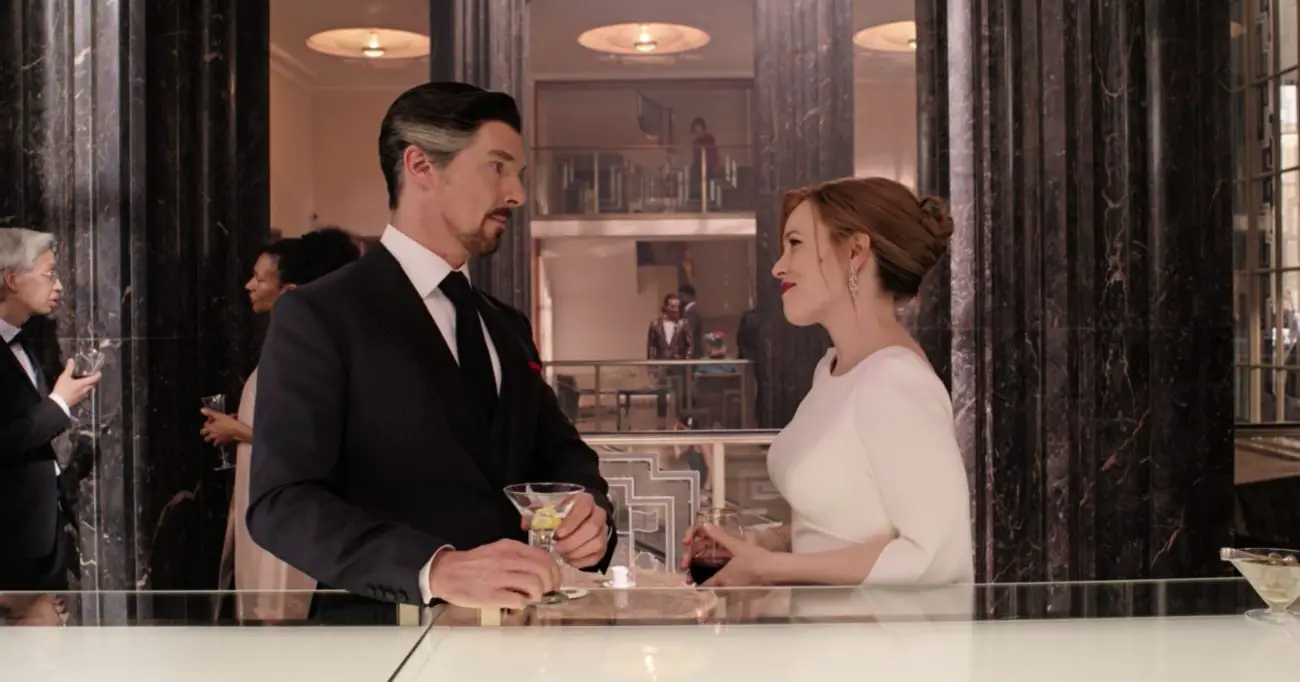
Unlike in the What If…? episode, however, time travel is not a plot point here; in-universe, it’s because the Time Stone was destroyed, but meta-textually it’s because they’ve already done that trope and we’re using a different fantasy plot device for our storytelling. Stephen can’t stop thinking about what might have been, but that’s a fruitless endeavor, because what’s done is done. Looking into the past while having to live in the present creates a divided self, and since our fantasy plot device is the multiverse, that divided self is gonna be represented by multiple selves.
Obviously, Stephen has quite a few selves at play here, but before I talk about them, I want to jump over to our primary antagonist, Wanda. For her, the metaphor of the divided self manifests as two variants representing the better and worse parts of her. 616-Wanda, our Wanda, is already way off the deep end by the time we meet her in this story. She’s got her hands on the Darkhold, and that thing is telling her in all caps to lean into being worse.
I appreciate that while Wanda is influenced by the Darkhold, it’s never framed as her being controlled by it, which would carry a lack of agency and a lack of responsibility. That’s an easy trope to fall into, but Wanda’s a stronger character than that, and her entire journey through the years has been turbulent and morally ambiguous. Again, we’re getting into connecting dots that the film could have done more to connect itself, but the thing about the Darkhold’s power over Wanda is skews her perspective. The Darkhold tells Wanda that she is the most powerful and important being in the universe; as Wong says, the Scarlet Witch is “prophesized to either rule or annihilate the cosmos.” This shift in perspective allows Wanda to think that any ambitions she pursues that are less destructive in comparison—like crossing dimensions to be with her children again—qualify as merciful, even if they come with a body count.
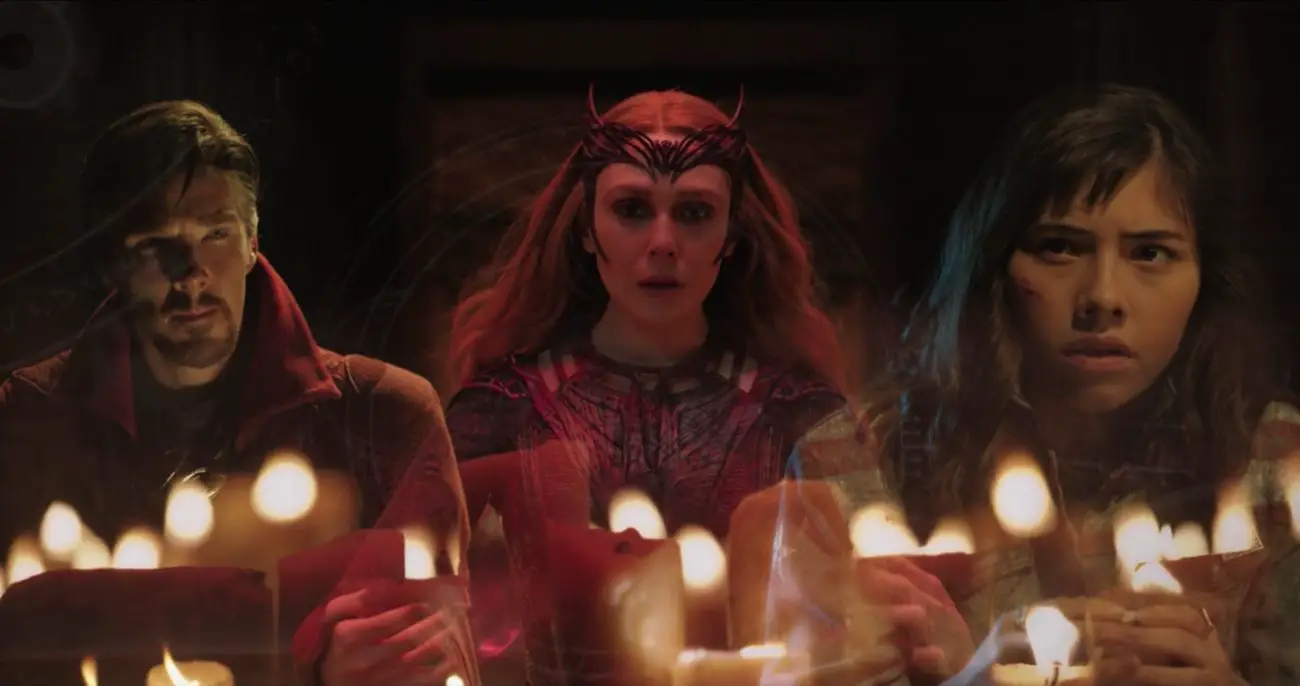
I say “allows” because again, Wanda is not being tricked, she is making her own decisions. That includes deciding to buy what the Darkhold is selling her, as it were. After all she’s been through, and all she’s lost, she was primed to accept whatever methods to get what she wanted, and whatever justification she could find to use those methods. It’s not just that she’s grieving for all the loved ones she’s lost—her parents, her brother, her lover/husband, her illusory children—it’s that these losses leave her with no stake in the world as it is.
I won’t get into a detailed analysis of her implied relationships with the other Avengers, but of the few she showed any kind of bond with, Steve and Natasha are gone, and Clint is retired to be with his family—y’know, that thing she doesn’t have. Probably feeling a little bit distanced there. She and Stephen’s connection is based on nothing more than professional courtesy; there’s no personal connection that would cause her to think of her actions as a betrayal. As for the world as a whole, between the Lagos incident in Civil War and the entire Westview saga of Wandavision, Wanda’s used to being thought of as a threat, and it seems she’s done trying to convince people otherwise. So what reason does she have not to abandon in this world, and what reason does she have not to wreck the place on her way out?
I mean, apart from the whole morality thing. But Wanda is well past the concept of caring about anyone other than her sons by this point—including, in a way, herself.
When Stephen asks Wanda, “What happens to the other you? What happens to their mother?” he doesn’t just mean the literal alternate universe variant of herself. Well, the character does, I suppose, but the screenplay points to a more symbolic meaning: what happens to Wanda herself, this Wanda, our Wanda, if she follows this path to its desired conclusion? All she wants is to be a mother again, but her way to get there means destroying the very part of her that makes her fit to be a mother—the part that is kind and loving and good. The way she uses dream-walking to possess 838-Wanda’s body to do her bidding is symbolic of the way she uses the idea of maternal love as a cover, a justification for her monstrous behavior. Every choice she makes in the name of love is poisoned because it is driven by fear, and as with Stephen, her fear manifests in a need for absolute control.
Stephen himself gets three variants in Multiverse, and in his case, each one represents a different specific aspect of his internal struggle. 838-Stephen, founder of the Illuminati, represents the danger his actions hold for the world at large. The way this is framed—the Illuminati’s concern that he will be the biggest threat to the multiverse—makes it not just about past actions, but what he might do in the future. That’s the thing about the “what if” question, is that it goes in both directions: “What if I made the wrong choice in the past?” and “What if I make the wrong choice in the future?”
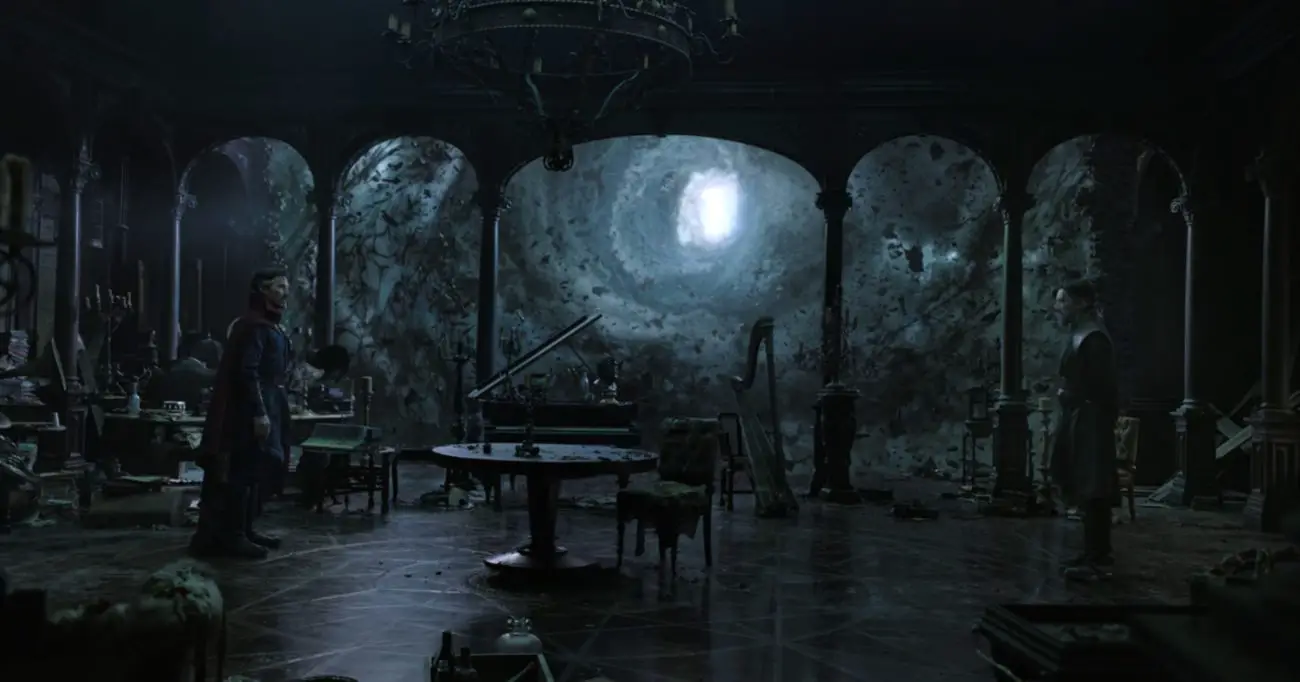
The evil variant he meets in the incursion-wrecked universe, referred to officially as “Sinister Strange,” represents his regret over his loss of Christine, taken to a morbid extreme. Through him, our Stephen is confronted with the understanding of how regret can poison him and turn him into a monster. This encounter is what allows him to accept that things are over with Christine, and move on with his life. I know that there are a lot of PalmerStrange shippers who don’t want to hear that, and look, I love their relationship too, but he’s not getting back together with her in the next movie, not even a variant of her; he can’t, or else the resolution of this film will be completely undermined. Again, some people are more invested in the superhero soap opera (supe opera?) than the thematic arcs, and I’m not saying they’re wrong for having those priorities. I’m just saying… if you want them to be together, there’s always fanfiction.
Finally, there’s the first one we see in the film, dubbed (somewhat ironically) “Defender Strange,” who starts out protecting America Chavez, but lets his fear of failure fuel his need for control, and decides to kill her in order to use her power to save the multiverse instead. This one, like Illuminati Stephen, returns to the future-tense version of “what if?” but in a much more specific way: it creates an opportunity for Stephen to make the same choice twice. No, it’s not the same Stephen both times, but 616-Stephen knows what his variant decided to do—in a way, he lived that experience through his dreaming of it—and when confronted with the decision on whether or not to kill America and take her power, the question of “what if?” finally becomes something actionable.
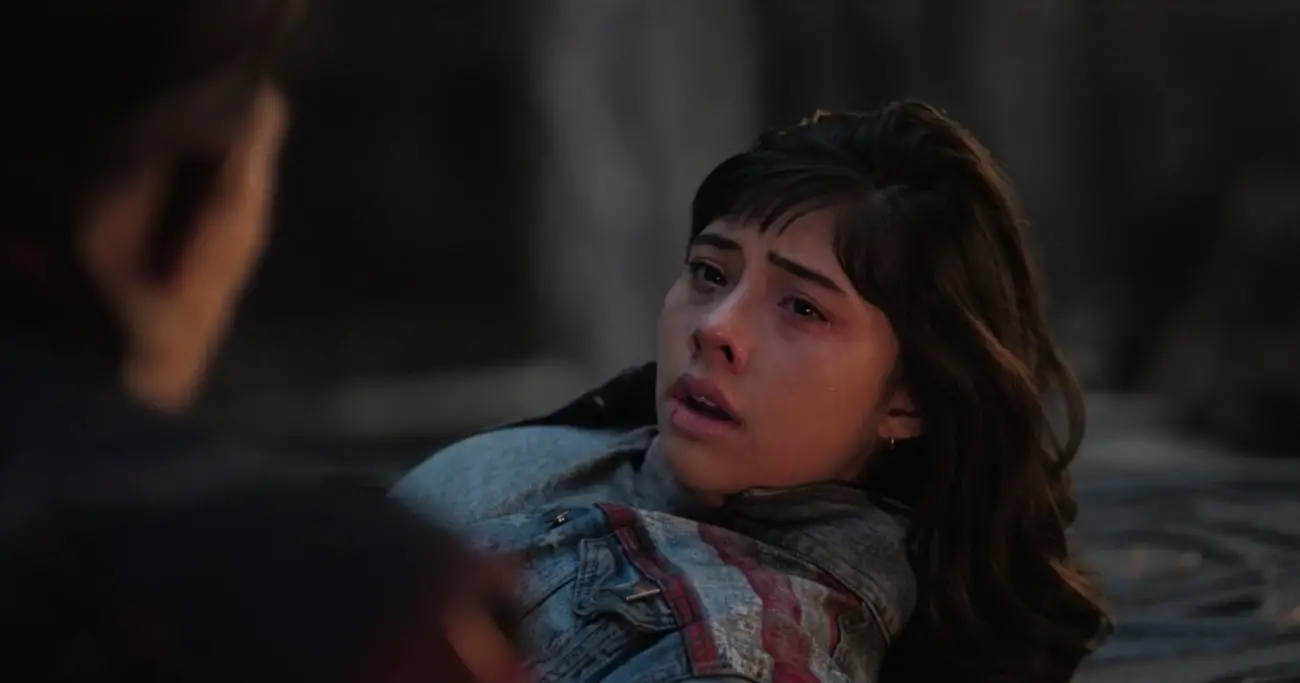
The most commonly offered antonym to fear (at least in fiction) is love, but in this film, the opposite of fear, and the ultimate weapon against it, is trust. You could also call it faith, but trust is the specific word that comes up in the pivotal moment of the film. In the moment of their most dire need, Stephen relinquishes his need for control, for the greater power he can use to shape the future, and instead acts on trust. He puts his trust in America Chavez, and tells her to trust herself as well—the most important act of mentorship.
Stephen has looked at his alternate selves and seen a pattern of behavior that disturbs him. Over and over, his various selves have made so many of the same mistakes—they’ve all failed to make things work with Christine, they’ve all done harm to the world in trying to control the future—and he thinks maybe he can’t be any different, that maybe he’s trapped inside himself. America, meanwhile, suffers from a similar crisis precisely because she has no variants: she’s only ever been able to see herself as the victim, either of circumstance, or scary witches from other universes, or her own uncontrollable power. She’s only ever been acted upon.
But when Stephen is confronted with the chance to make the exact same choice that Defender Strange made at the beginning of the film, he realizes his ability to change. He makes a different choice, because he can, because he has the power to break free of the fear that he and his variants have allowed to control their lives. In a way, he finds that the purest form of control over one’s future is to accept the limits of that control. And in so realizing this, he’s able to pass it on to America, to tell her that she is, and always has been, more than how she’s seen herself. He trusts her, and he tells her to trust herself.
Stephen and America win by letting go of their fear, which Wanda cannot, will not, do. So America is able to defeat her with the classic ironic punishment: giving her the thing she wants. Wanda finally gets to be face-to-face with her children again, but like Sinister Strange, she has let the fear transform her into something that is itself terrifying. When Billy and Tommy see her, they don’t see their mother; they see the monster who hurt their mother. They see the Scarlet Witch.
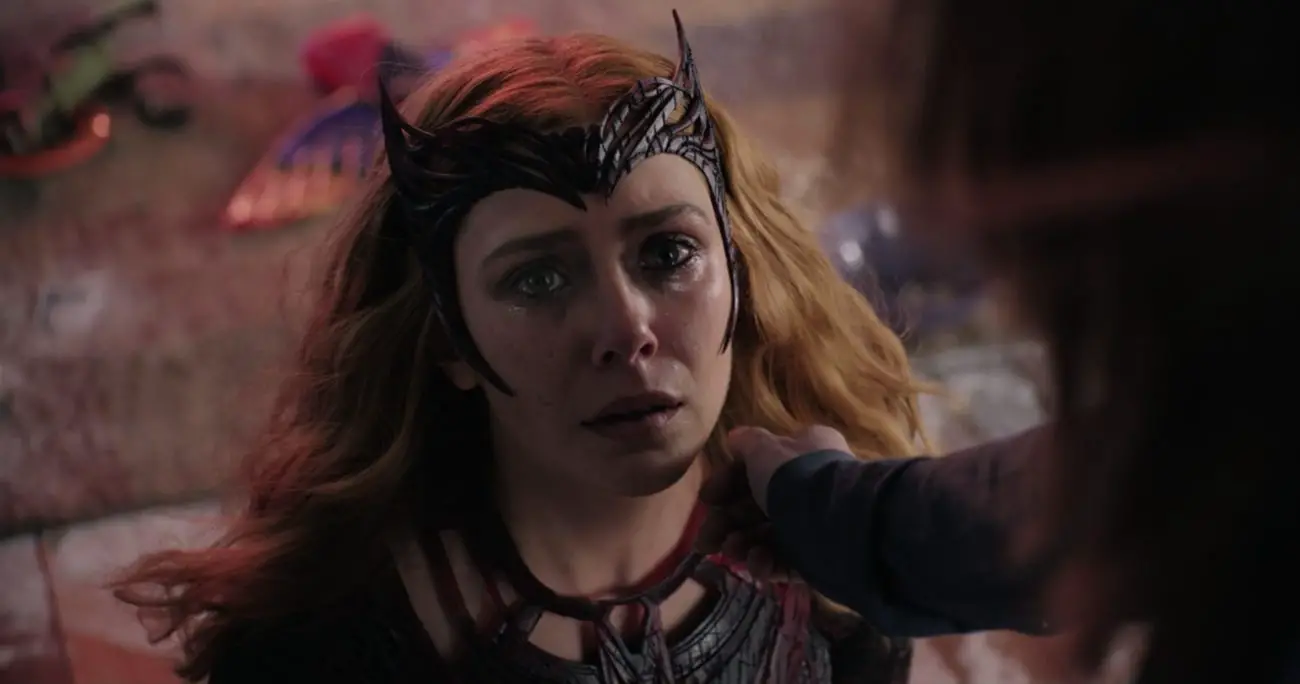
Among all the scary things in this horror movie, this is the real nightmare. This is the kind of fear that lives in my reality. It’s the fear that those you love most in the world will see what you are deep down, and find it so horrible that they don’t even recognize you. It’s the fear so strong that seeing it realized is enough to finally stop Wanda. It breaks her will, and when she awakens to what she’s done, she destroys the Darkhold, and herself as well.
Of course, Wanda’s not going to stay dead. Even before the rumors of her getting a solo movie starting popping up, we knew there was no way Marvel was going to let one of their most popular characters go at the height of her fame, not as long as Olsen would be willing to come back for more. When she eventually is revealed to be alive, Wanda’s going to have a new journey ahead of her, and I can only speculate on what that might be, but I certainly have my ideas.
In the meantime, though, our heroes have conquered their fears. For now. Of course, it’s never that easy; fighting the fear is a process you have to go through every day, but they’re ready to do the work. And as Stephen and Wong say in their final exchange, none of them has to do it alone.
Doctor Strange in the Multiverse of Madness is a horror movie, to be sure, but on a deeper level it’s also a movie that is about fear. It’s about the fear of failure, the fear of making the wrong choices, the fear of the terrible things you might be capable of. It’s about how to confront that fear with trust, and with acceptance of things beyond our control. It’s about how we’re all just trying to do our best, and the best way to go about that is to trust in ourselves and each other.


